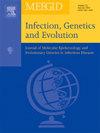Genomic surveillance of SARS-CoV-2 variants in Guangzhou, China, from April 2023 to March 2024
IF 2.6
4区 医学
Q3 INFECTIOUS DISEASES
引用次数: 0
Abstract
Background
After the relaxation of stringent control measures, nationwide large-scale SARS-CoV-2 surveillance was gradually phased out post-2023, transitioning to focused monitoring of Influenza-like Illness (ILI) through sentinel hospitals and laboratory networks. Nationally, surveillance of respiratory pathogens was performed via random sampling, resulting in a lack of microbial monitoring results in Guangzhou China. A crucial area of scientific inquiry is whether the current cases are attributable to the emergence of a novel SARS-CoV-2 variant.
Methods
Throat swab samples were obtained from 1478 outpatients and 337 hospitalized patients with fever (temperature ≥ 38 °C) and cough or sore throat to detect SARS-CoV-2. The positive samples were subjected to viral whole-genome sequencing and phylogenetic analysis. Respiratory pathogen multiplex PCR tests were performed on stratified random samples.
Results
SARS-CoV-2 was detected in 517 (28.48 %) patients. There were higher rates of SARS-CoV-2 infection among women, older patients and those who were hospitalized. A total of 299 high-quality SARS-CoV-2 sequences were obtained, including 12 clades and 71 pango lineages. The advantageous clades evolved over three peak periods of infection, from BA.5 (April 2023) to XBB (June to July 2023) and then to JN.1 (February 2024). A total of 590 distinct amino acid mutations were identified across the sequences. The highest prevalence of mutations was observed for spike protein mutations, with more than 50 % of the three epidemic peaks detected. Epidemiological profiles of interactions between SARS-CoV-2 and other respiratory pathogens exhibit considerable variation across different seasons, with a tendency toward suppression within each.
Conclusion
Surveillance by Guangzhou Eighth People's Hospital provides a snapshot of the epidemic in Guangzhou, which is consistent with the national epidemic and offers important data for understanding the spread of SARS-CoV-2 in southern China.
2023 年 4 月至 2024 年 3 月期间在中国广州对 SARS-CoV-2 变种进行基因组监测。
背景:在严格的控制措施放松后,2023年后逐步取消了全国范围内大规模的SARS-CoV-2监测,过渡到通过哨点医院和实验室网络对流感样疾病(ILI)进行集中监测。在全国范围内,对呼吸道病原体的监测是通过随机抽样进行的,导致广州缺乏微生物监测结果。科学探究的一个关键领域是,目前的病例是否归因于新型SARS-CoV-2变体的出现。方法:对1478例门诊患者和337例住院发热(体温 ≥ 38 °C)、咳嗽或咽痛患者采集咽拭子标本,检测SARS-CoV-2。阳性样本进行病毒全基因组测序和系统发育分析。对分层随机样本进行呼吸道病原体多重PCR检测。结果:517例(28.48 %)患者检出SARS-CoV-2。女性、老年患者和住院患者的SARS-CoV-2感染率较高。共获得299个高质量SARS-CoV-2序列,包括12个进化支和71个pango谱系。从BA.5(2023年4月)到XBB(2023年6 - 7月)再到JN.1(2024年2月)三个感染高峰期,优势枝进化。在整个序列中共鉴定出590个不同的氨基酸突变。刺突蛋白突变的突变发生率最高,在三个流行高峰中检测到的突变发生率超过50% %。SARS-CoV-2与其他呼吸道病原体相互作用的流行病学概况在不同季节表现出相当大的差异,并且在每个季节都有抑制的趋势。结论:广州市第八人民医院的监测提供了广州市疫情的概况,与全国疫情一致,为了解SARS-CoV-2在华南地区的传播提供了重要数据。
本文章由计算机程序翻译,如有差异,请以英文原文为准。
求助全文
约1分钟内获得全文
求助全文
来源期刊

Infection Genetics and Evolution
医学-传染病学
CiteScore
8.40
自引率
0.00%
发文量
215
审稿时长
82 days
期刊介绍:
(aka Journal of Molecular Epidemiology and Evolutionary Genetics of Infectious Diseases -- MEEGID)
Infectious diseases constitute one of the main challenges to medical science in the coming century. The impressive development of molecular megatechnologies and of bioinformatics have greatly increased our knowledge of the evolution, transmission and pathogenicity of infectious diseases. Research has shown that host susceptibility to many infectious diseases has a genetic basis. Furthermore, much is now known on the molecular epidemiology, evolution and virulence of pathogenic agents, as well as their resistance to drugs, vaccines, and antibiotics. Equally, research on the genetics of disease vectors has greatly improved our understanding of their systematics, has increased our capacity to identify target populations for control or intervention, and has provided detailed information on the mechanisms of insecticide resistance.
However, the genetics and evolutionary biology of hosts, pathogens and vectors have tended to develop as three separate fields of research. This artificial compartmentalisation is of concern due to our growing appreciation of the strong co-evolutionary interactions among hosts, pathogens and vectors.
Infection, Genetics and Evolution and its companion congress [MEEGID](http://www.meegidconference.com/) (for Molecular Epidemiology and Evolutionary Genetics of Infectious Diseases) are the main forum acting for the cross-fertilization between evolutionary science and biomedical research on infectious diseases.
Infection, Genetics and Evolution is the only journal that welcomes articles dealing with the genetics and evolutionary biology of hosts, pathogens and vectors, and coevolution processes among them in relation to infection and disease manifestation. All infectious models enter the scope of the journal, including pathogens of humans, animals and plants, either parasites, fungi, bacteria, viruses or prions. The journal welcomes articles dealing with genetics, population genetics, genomics, postgenomics, gene expression, evolutionary biology, population dynamics, mathematical modeling and bioinformatics. We also provide many author benefits, such as free PDFs, a liberal copyright policy, special discounts on Elsevier publications and much more. Please click here for more information on our author services .
 求助内容:
求助内容: 应助结果提醒方式:
应助结果提醒方式:


